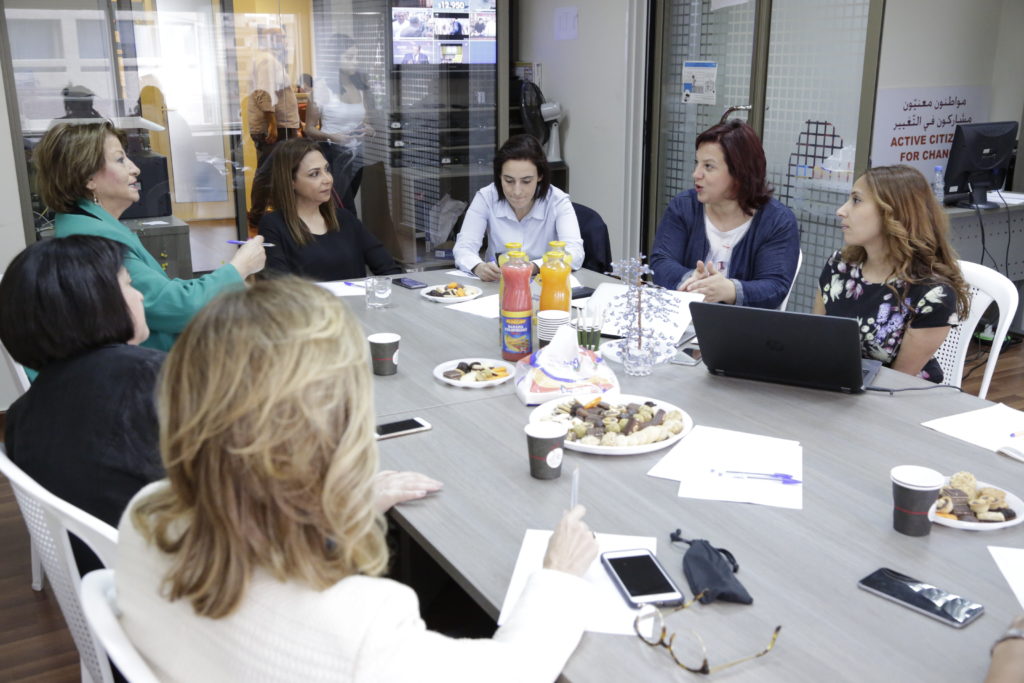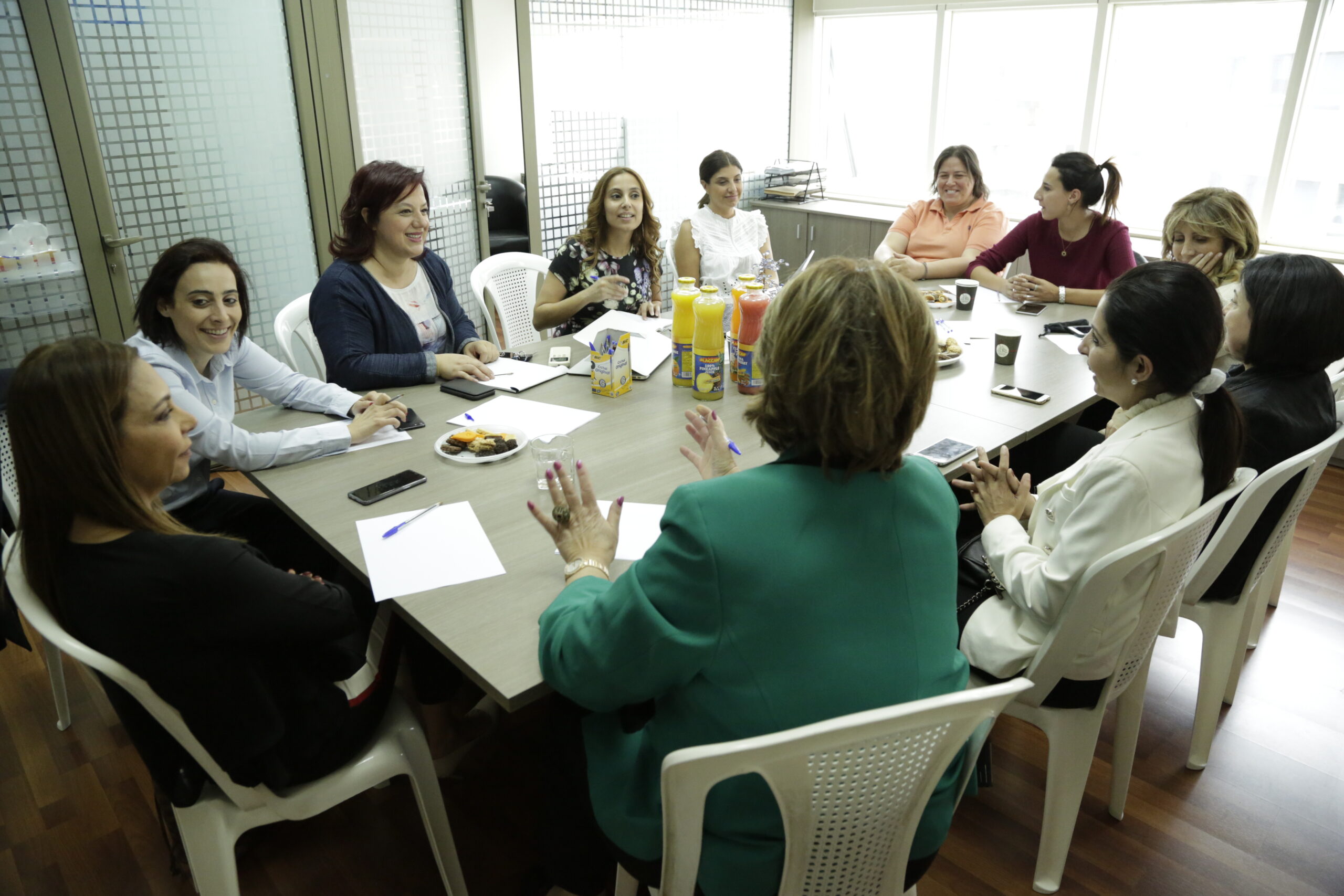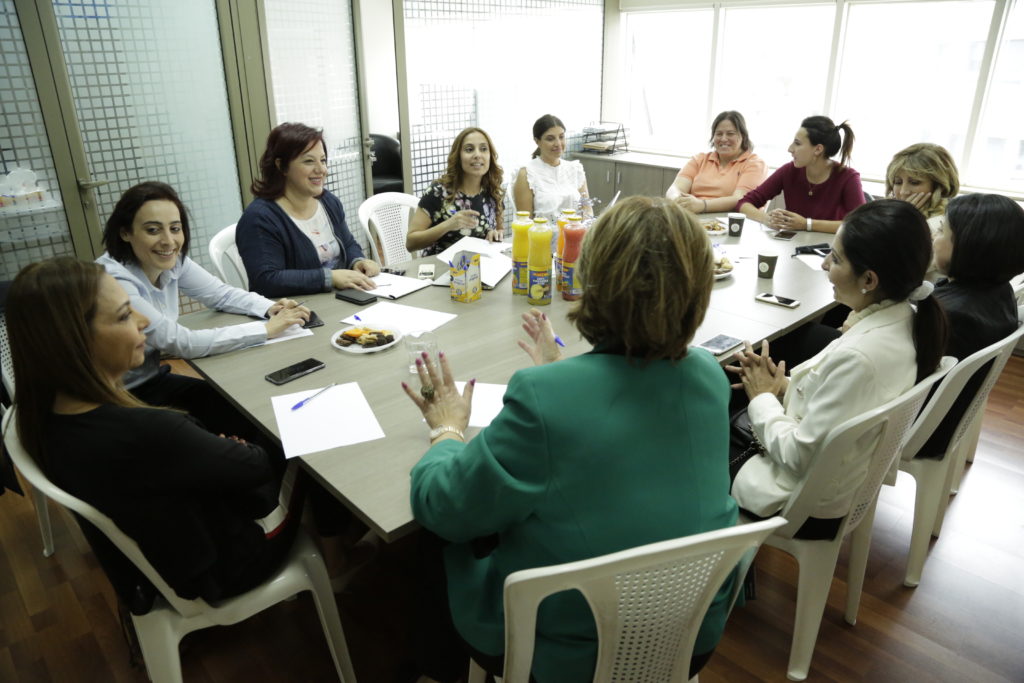Challenges for Lebanese female candidates in accessing mass media and communications
A lack of equal access to the public sphere via mass media, was the main point raised by participants in a WE4L Lebanon Parnter Maharat focus group held on 9 May 2018 – three days after Lebanon’s parliamentary elections.
The 10 participants – all of whom were female – agreed that there were ongoing challenges in access to media, partly regarding high financial costs for airtime, which established candidates or politicians were able to pay. Difficulty in gaining airtime on paid media channels came not only from the cost but also because of the topics discussed. Additionally, candidates from journalistic or media backgrounds stated that their positions did not greatly help in their access to paid media.
The participants highlighted the general importance of direct communication with the public, which for the most part they did not find difficult. The women did not feel any problem in communicating with the people in the streets, homes, or public places; or of any hindrances based on their gender. Some felt that in Lebanon direct constituency services were much more valued than environmental work for example. Additionally, participants pointed out that the media that did empower women when it had been paid to showcase women, presenting both advantages and disadvantages.
Laurie Haytayan (Beirut I District)
I received more interest in coverage from foreign media because I am a woman and I a have a civil society background. On the other hand, communication with local media was conditional and for paid appearances. The program “Women in Front” helped us appear on Al-Jadeed. This appearance included an interview and graphics but it was not at a peak time. I initiated the approach for an appearance on Lebanon TV. During the elections, we should have had more opportunities to appear in mass media. However, the problem we face is that most media has been ‘bribed’ by status-quo politicians who will likely rule in the coming period, further threatening the foundations of democracy. I primarily used social media to communicate my messages.
I did not have a plan to target voters in Beirut I through social media. My campaign was aimed at a general Lebanese social media audience, with a non-sectarian approach. I knew the Armenians would likely not give me their votes especially given the people of Beirut I are not all residents in Beirut.
Nohad Doumit (Beirut II district)
I did not make any mass media appearances, even though I submitted a request to appear on Lebanon TV with no response. ‘Koullouna Watani’ came together as a coalition in order overcome this issue, and I personally do not know how to use social media effectively.
The media was not really the deciding factor. Even when I was president of the nurses syndicate I couldn’t get my voice to be heard, so I did not expect to be heard as a candidate. The problem is the media is controlled by and affiliated to political parties. My journalist friends used to suggest I create a scandal in order to get air time. It was easier to make direct contact with the public through other means, especially that I am a nurse and I deal with people all the time.
Maguy Aoun (West Bekaa – Rachaya)
I was a candidate for the Maronite seat in an area where there is a lot of traditionalism. I was the only women among three competing lists in my area. I had communications with civil society coalitions Sabaa and Koulluna Watani, however they did not have a base there. The main difficult was that the community is closed and conservative, including in the choices made by young women.
I sent two types of messages using social media. I targeted women residing in al-Bekaa with the help of a social media team, with the most investment in Facebook. I also sent invitations to local women and met with them in order to communicate using my humanitarian work. Additionally, there is was little diversity among candidates in this area, which is controlled by certain people, however we were new faces.
I was offered money in order to win votes, not only because I am a journalist, but because I provide direct services to people. As more than half the voters in the area are females, I encouraged women in my community to communicate with their spouses to support me. At the end of the elections, I received more Sunni and Shia votes than Christian votes.
The most effective means of communication were social media and public speaking. I could not appear on television often, though I appeared once on Al-Jadeed with Catherin Hanna as part of the “Women in Front” program, and once on Lebanon TV through Maharat’s invitation. I also spoke on one radio show on the Voice of Lebanon free of charge, but with the support of the Kataeb party.
Mary Salem al-Khoury (Women of Akkar list)
We held many interviews with foreign media from Italy, Egypt and Turkey, as we were the only women-only list. A non-paid report was made on MTV on the formation of this unique women-only list but I conducted most of my campaign on social media. Direct contact with the public, meeting them and talking to them was also very important and beneficial. We have worked in the environmental field for a long time, and the people of Akkar demanded that we return to hold more conferences and talks on this topic.
Waad Sekriya (Baalbak-Al Hermel):
Access to media was provided to me via the Maharat Foundation, which invited me to appear on Lebanon TV. I also used social media a lot to send different messages to each region, as well as to send messages to Lebanese expatriates. I was the first woman to run for elections in Baalbek al-Hermel and there was a huge support from women who previously did not necessarily care about elections. I was subject to a lot of harassment, including threats to people and home-owners I visited, all because I ran for elections in a region dominated by large political parties. I did not feel I was harassed and threatened because I was woman, rather because I ran under the slogan of the Arez (Cedars) List which was provocative in the region and raised questions about who was backing me.
Zeina Majdalani (Beirut II)
I appeared on Lebanon TV with Maharat Foundation’s invitation in support of the “Women in Front” program. I also appeared on OTV and “Shababeek” on BBC Arabic. The majority of my campaign was on social media (Facebook and ‘Broadcast’ on Whatsapp), where I targeted voters in my region, especially youth, through boosted (paid) posts. I did not want to run for election at first but I was encouraged by others and my circumstances to do so. I started working on communicating my messages through social media and produced content and a strategy to post this content. I was in a strongly competitive list and I feel that my noticable impact resulted from communicating effectively with the public. Building a media image, especially via social media, was key to this.
Layal Bou Moussa (Batroun)
I appeared on Al-Jadeed TV during the news section, since I am a presenter on the channel. I also appeared on MTV and Al Manar, which are the most watched in Batroun. My appearance on Al Manar was important because it gave me an opportunity and platform to give my opinion on political issues in addition to providing logical arguments in support. My communication strategy focused on social media as well as spending time living in both Batroun and Beirut to deliver my message personally. This included using billboards in al-Berbarah. People were surpised to see me when I used to go to the souks of Batroun to talk to people. I communicated directly with the public and sought to find out which youth would support me. I used to ask them to support me and tried to build a team of volunteers. As a woman I do not feel there were problems communicating with women. We are capable of making a difference if we put ourselves in the field and communicate directly with people. However, the time dedicated to communicating directly with the public was short.
Elianne Kazzi (Al Chouf-Aley)
I did not receive any television coverage. The people of my region of Jiyeh know me because I was active on the issue of waste sorting in the region, and because my father was a teacher there. They knew me as the daughter of Michel Al Kazzi. The elections results were not good and I was counting on a group of votes, which either evaporated or were lost when people outside Lebanon could not vote.
Josephine Zougheib (Kesserwan- Jbeil)
I had many television appearances on MTV and LBCI before the campaign, however during the campaign I had no appearances. I worked on my Facebook profile a year ago and produced my ow content for it. When I was nominated, I was only able to appear in the media through an agreement paid for by “Women in Front”. Even though I was a member of the municipality in my hometown and I have a strong communal presence through my foundation, I couldn’t win enough votes. This showed how Kesserwan and its voters are bought with money. I am a known activist for the environment, and an expert in development, unfortunately however, the topic of the environment does hold much importance for people and it seems that it does not reach the parliament unless it has to do with the rock crushers.
My work was not reflected in real numbers. In the final days before voting, public opinion was preparing for the battle for the republic and the battle for the ahed (era), where certain people were selected to reach the House of Representatives. This did not help motivate people to vote for me. I went to sleep thinking I would have 250 votes and woke up to find these votes had disappeared. The large political parties remain the ones with the most impact and capabilities.
Rima Hamide (Bent Jbeil)
I was a candidate for the Sabaa Party and was able to appear on MTV in a paid-for program representing Sabaa. Each of us was given three minutes to talk. I also requested to appear on Lebanon TV, but I did not get a reply. I also used Facebook live a lot and tried to meet with people in public souks [shopping areas] and distributed brochures there. Some people accepted and some didn’t. As a female candidate on the list, I had a lot of communication with others and I did not feel there was any discrimination against me. However, all of these factors did not translate into votes.

Recommendations
Maguy Aoun suggested that equal opportunities for all candidates be provided under certain guidelines. A certain number of hours across Lebanese channels should be provided equally for all candidates without paying any amount of money. Also, the number of hours and the number of appearances should be determined to reach audiences equally. The amount of information about candidates available to the public in the media should also be equal.
Mary Salem al-Khoury said that new candidates should have appeared more in the media, and that media be more democratically organized.
Laurie Haytayan said that there should be public disclosure of purchased election-related media. She pointed out that certain provisions within the election law should have been applied to electoral spending, and requested that more stringent controls be put in place to prevent exploitation by ministers running as media-favored candidates with undue influence during the election campaign.
Zeina Majdalani suggested a move to an electronic voting system.
Layal Moussa said that the media constituted a political player within the electoral process, and that it supported whoever furthered its interests, adding that media bias should be exposed. She also discussed the importance of running large campaigns, and that local campaigns should be further improved.
Elianne Kazzi suggested the elections only be broadcast on Lebanon TV.
Josephine Zougheib pointed to the problems with how the announcement of results took place and suggested that the place of announcement be broadcasted beforehand. She also highlighted the fact that the mayor of her municipality is the owner of the billboard company Skaro, which controlled all the advertisements of the elections, consituting a monopoly.





